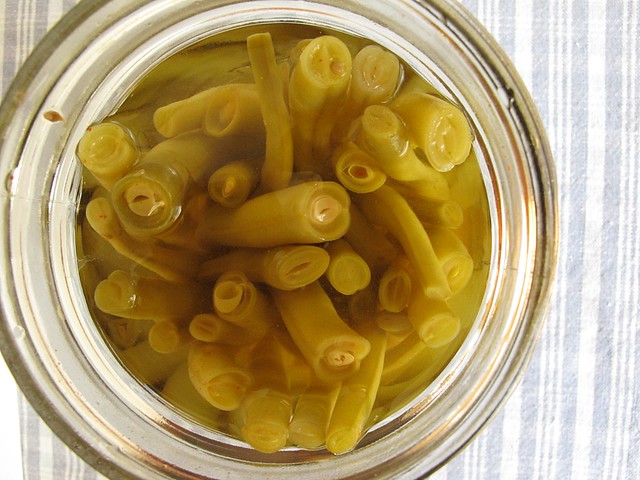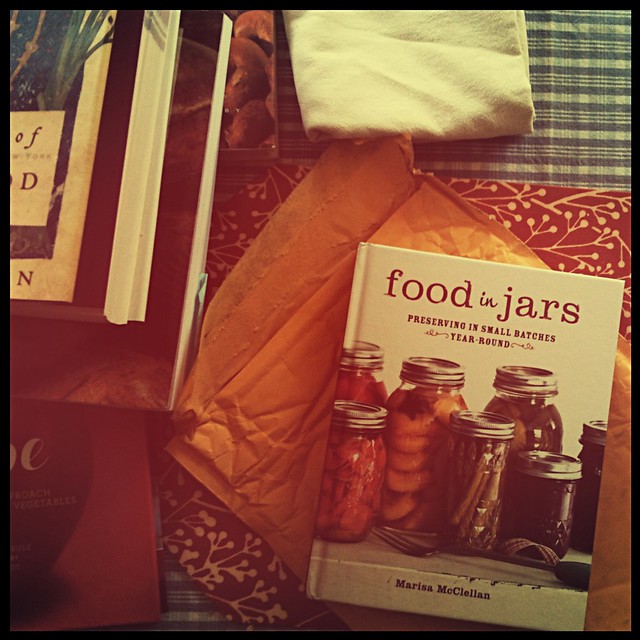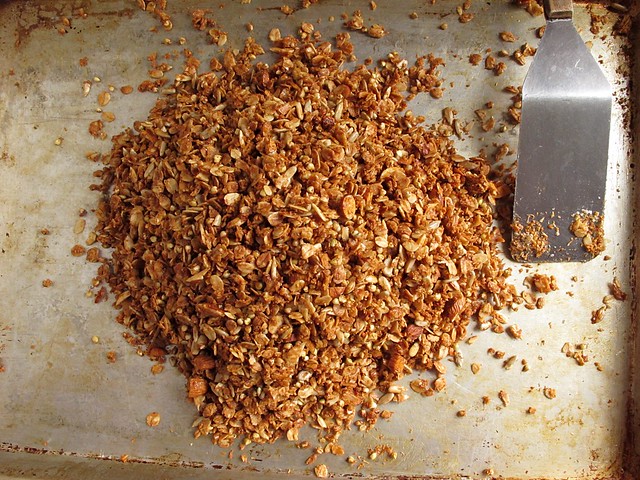Maybe some of the chatter about the new Food in Jars cookbook has died down, but I will gladly start it back up again. You might notice the lilacs on the table in the photo below, a visual clue to how long I've been mentally adding up my thoughts on Marisa McClellan's new canning tome. I'm really not even sure how to start, since Marisa was that little whisper in my ear that transformed me from the girl whose family canned, to the girl who confidently cans herself.
My Mother and Grandmother will forever echo in my mind as steadfast preservers, their shelves steadily growing each Summer and then beginning to dwindle by Spring of the following year. Canning was a way of life for our family, our Northern Wisconsin gardens always struggling to produce nearly all we needed in the short growing season. The glass jars deeply lined the shelves my Dad built my Mom in our basement, simple but well constructed out of pine. I never realized what a luxury it was to be asked to go downstairs and pick out a jar of vegetables for dinner - my choice. I now know that those short journeys to the basement were life changing and a blessing of wholesome choice.
My Gram's house was a scant half mile from ours, her little red log cabin had enormous rocks as a foundation which kept her basement cool, dark and scary. I would be afraid to venture down the rock stairs (or at least they seemed like rocks; that basement seemed like a castle dungeon to me) to the tiny room just at the bottom. When the door was opened and the light flipped on, a magical and colorful land woke up: floor to ceiling shelves holding all kinds of things in jars. It was the pantry that all pantries want to be when they grow up, and the one I will judge all pantries to.
At the feet of those women, I unknowingly was instilled in good food and preservation. As most of us often do growing up, I didn't hold dear those things I was raised to love. I'd dabbled in a few canning projects - those adventures were always peppered heavily with phone calls to my Mom. She talked me through many first time experiences, consulting her aged Ball preserving book for ratios or telling me how they always did things - little tips to make things easier on the next try. My canning life never stuck for good, I seemed to rest on the laurels of my family and treated preservation as something I would do if I had a bigger garden or a bigger family.
I never really owned the feeling of being a full-fledged preservationist until after I began this blog, and after I happened upon the Food in Jars recipe for Dilly Beans which I printed off and also shared with my Mom. That first Summer my true roots began to show as I worked my way through Marisa's jams and jellies. All of a sudden, I treated my local farmer's markets as an extension of my own backyard garden. Marisa taught me that I didn't have to grow it myself to preserve it, and that I could can just a few jars of something unusual and not can dozens of jars of pantry staples. Food in Jars became a regular stop on my Internet rounds, and Marisa became a real person that answered the questions I occasionally emailed her, a prophet of the DIY food scene that was nearly an in-the-flesh friend to me. Her blog became the source I compared against for canning inspiration and knowledge.
I couldn't have been more excited when I first heard about her book, and my excitement remained until May when the book was released. When my copy arrived in the mail, it came on a day when my son was still in school and I was pretty much caught up on my housework. In my own celebratory way, I marched down to my basement and plucked a jar of dilly beans off the shelf and opened them to eat with my lunch. I ate them thinking of Marisa and how happy I was for her. Then, I took my new book outside and read half of it from the beginning in the cool Spring sunshine.
I've done a bit of jam-making at the beginning of this year, but my preservation season is off to a slow start. This book is marked up with lots of post-it page markers - reminding me that I need to find apricots for the Apricot Jam and to pick up cantaloupe later this Summer for the Cantaloupe Jam with Vanilla (which Deena at Mostly Foodstuffs has already declared lives up to the claims of tasting exactly like a Creamsicle). It will be a good resource for this Summer, and beyond - giving recipes for year-round pantry staples like can-able Grainy White Wine Mustard and a number of non-canning, frequently stored in jars items like granolas.

Ginger-Walnut Granola, sweetened with Steen's cane syrup I happened to have stashed in the freezer...
The granolas were actually some the things I was most looking forward to reading about and sampling. I had made this recipe Marisa wrote years ago on SlashFood, a number of times - and a version appears in the cookbook. Of all the things I usually never use a recipe for, I actually followed two of the granola recipes exactly to give them a test run. Both were delicious, especially the one made with buckwheat. Marisa calls for kasha, which are buckwheat groats that have been toasted. Kasha is available for purchase, but I had buckwheat on hand and sprouted/dehydrated some myself to use. This recipe alone (in my opinion) could be worth the cover price! It's much crunchier than traditional granola, and if you have gluten-free oats, it's GF as well. I tried not to overindulge in granola eating, but both jars didn't last long. And, I learned that to get naturally forming clumps in homemade granola a couple of egg whites can often help, as can letting the granola cool when gently heaped up into a mound in the center of the baking sheet.
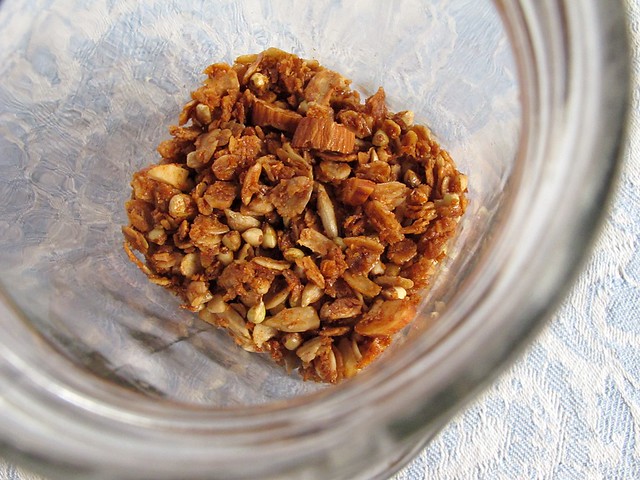
At the feet of those women, I unknowingly was instilled in good food and preservation. As most of us often do growing up, I didn't hold dear those things I was raised to love. I'd dabbled in a few canning projects - those adventures were always peppered heavily with phone calls to my Mom. She talked me through many first time experiences, consulting her aged Ball preserving book for ratios or telling me how they always did things - little tips to make things easier on the next try. My canning life never stuck for good, I seemed to rest on the laurels of my family and treated preservation as something I would do if I had a bigger garden or a bigger family.
I never really owned the feeling of being a full-fledged preservationist until after I began this blog, and after I happened upon the Food in Jars recipe for Dilly Beans which I printed off and also shared with my Mom. That first Summer my true roots began to show as I worked my way through Marisa's jams and jellies. All of a sudden, I treated my local farmer's markets as an extension of my own backyard garden. Marisa taught me that I didn't have to grow it myself to preserve it, and that I could can just a few jars of something unusual and not can dozens of jars of pantry staples. Food in Jars became a regular stop on my Internet rounds, and Marisa became a real person that answered the questions I occasionally emailed her, a prophet of the DIY food scene that was nearly an in-the-flesh friend to me. Her blog became the source I compared against for canning inspiration and knowledge.
I couldn't have been more excited when I first heard about her book, and my excitement remained until May when the book was released. When my copy arrived in the mail, it came on a day when my son was still in school and I was pretty much caught up on my housework. In my own celebratory way, I marched down to my basement and plucked a jar of dilly beans off the shelf and opened them to eat with my lunch. I ate them thinking of Marisa and how happy I was for her. Then, I took my new book outside and read half of it from the beginning in the cool Spring sunshine.
I've done a bit of jam-making at the beginning of this year, but my preservation season is off to a slow start. This book is marked up with lots of post-it page markers - reminding me that I need to find apricots for the Apricot Jam and to pick up cantaloupe later this Summer for the Cantaloupe Jam with Vanilla (which Deena at Mostly Foodstuffs has already declared lives up to the claims of tasting exactly like a Creamsicle). It will be a good resource for this Summer, and beyond - giving recipes for year-round pantry staples like can-able Grainy White Wine Mustard and a number of non-canning, frequently stored in jars items like granolas.

Ginger-Walnut Granola, sweetened with Steen's cane syrup I happened to have stashed in the freezer...
The granolas were actually some the things I was most looking forward to reading about and sampling. I had made this recipe Marisa wrote years ago on SlashFood, a number of times - and a version appears in the cookbook. Of all the things I usually never use a recipe for, I actually followed two of the granola recipes exactly to give them a test run. Both were delicious, especially the one made with buckwheat. Marisa calls for kasha, which are buckwheat groats that have been toasted. Kasha is available for purchase, but I had buckwheat on hand and sprouted/dehydrated some myself to use. This recipe alone (in my opinion) could be worth the cover price! It's much crunchier than traditional granola, and if you have gluten-free oats, it's GF as well. I tried not to overindulge in granola eating, but both jars didn't last long. And, I learned that to get naturally forming clumps in homemade granola a couple of egg whites can often help, as can letting the granola cool when gently heaped up into a mound in the center of the baking sheet.

With Spring asparagus in the supermarkets, I took advantage of the seasonality and decided to put up a small batch of Pickled Asparagus. I picked up two large bunches which only amounted to about 2 1/2 lbs. (The recipe called for 4 lbs.) I got two jars with spears, and then decided to re-blanch the tougher stems and pickle up a third jar containing them since I had extra brine. I actually haven't transferred them to the dark basement yet, because I've enjoyed looking at them so much. I haven't cracked them open to taste them yet either - but I'm certain they won't disappoint. One thing I've come to know about Marisa's recipes is that they are always spot-on.
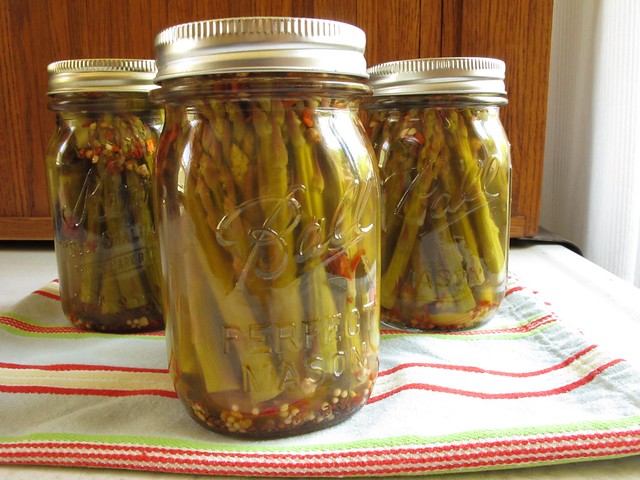

I have a few canning books on my personal shelf now that have easily slipped into the classic category. Now right next to Linda Ziedrich and Pam Corbin sits cookbook author Marisa McClellan's first book, and that name printed on the front of a beautiful, hardcover book makes me as proud as if it were my own name. I can't really be sure why this is. It could be because the world of preservers is bonded by not only economy, thrift and seasonality, but also by unspoken vows of commonality. We are happiest when those we know give unending gifts to the canning world, the recipes in this book will do just that - and will continue to do it for many years to come.
DISCLOSURE: I received a copy of this book for review, but all of my thoughts and opinions are my own. I am extremely happy to have this book in my collection, and look forward to using it heavily!
DISCLOSURE: I received a copy of this book for review, but all of my thoughts and opinions are my own. I am extremely happy to have this book in my collection, and look forward to using it heavily!


